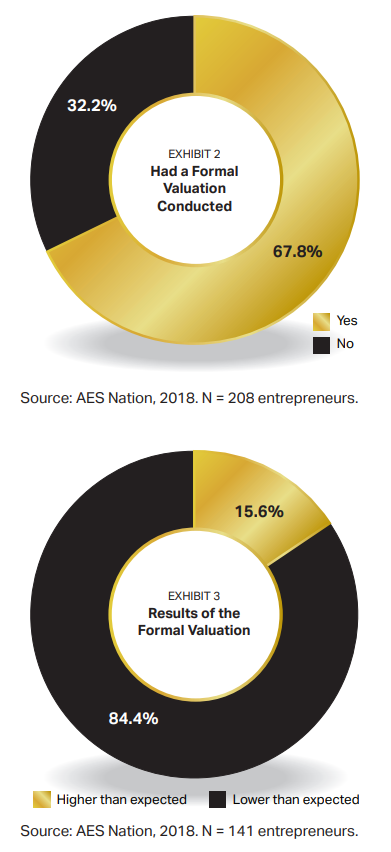 Key Takeaways
Key Takeaways
-Formal business valuations often come in lower than entrepreneurs expect.
-There are at least six commonly used valuation methods, each with pros and cons.
-Choosing the right method for your situation is both an art and a science.
If you think you know the true financial worth of your company, a formal business valuation might change your mind.
If you’re planning to sell your business, or even if you’re just thinking about possibly doing so down the road, you’re going to want to have a formal business valuation conducted. Formal valuations are often very useful in helping all parties by providing, at the very least, a solid starting point for negotiations.
But you might want to value your business even if you have no intention of selling. For example, a formal valuation can be an important step to take if you are looking for credit, determining the ownership percentages of partners or going through a divorce.
As you’ll see, you might be surprised by what you discover when you get your company formally valued.
Perception vs. Reality
According to a survey by AES Nation of 208 successful business owners looking to sell their business within the next five years, about 70 percent have had a formal valuation conducted within the previous three years (see Exhibit 2). As business owners get closer to deciding to sell their company, we tend to find that they are more likely to have it valued. That makes sense, given that a formal business valuation is often required when selling a business.
When a formal valuation is done, the results are often unexpected. Consider that nearly 85 percent of the entrepreneurs surveyed by AES Nation said the valuation came in lower than they anticipated (see Exhibit 3). These entrepreneurs clearly had overestimated their companies’ worth—not terribly surprising, given how hard they likely worked to build their businesses and how emotionally invested they are in them.
Still, this finding should give you pause as an entrepreneur. If your perception of your company’s value is too high, you might end up walking away from some solid offers. In fact, if your determination of the value of your company is meaningfully greater than the value determined through a formal valuation, there might not be many buyers taking interest in your business at all.
Note that 15 percent of the entrepreneurs surveyed by AES Nation were pleasantly surprised by the formal valuation because it came in higher than they expected. There are potential problems when you undervalue your company, too. For example, you might take a low offer that is clearly not in your best financial interests.
The most interesting finding, to us, was that not one of the entrepreneurs said the valuation was “just right.” This strongly suggests that a formal valuation is an important step in reconciling perception with reality.
Important: Formal valuations are not necessarily the price your company will ultimately sell for. They are generally the starting point for negotiations and helpful in justifying a price.
Examples of Business Valuation Methods
So where to begin? There are a number of business valuation methods that entrepreneurs who are thinking of selling their company should be aware of.
The following is a brief overview of six commonly used business valuation methods.
1. Market value company valuation. This is a comparison of your business with the sale price of similar businesses. Comparative data is required. In some situations, such as those involving the sale of relatively small companies, such information is not available or is not very informative.This method can be a good starting point in helping determine what your company is worth, and it helps start the discussions about selling your company. However, it can be imprecise and is often quite subjective. Therefore, your and your team’s ability to negotiate becomes especially important when this approach is used.
2. Asset-based company valuation. This is a balance sheet approach that calculates the company’s book value—its total assets minus the total liabilities of the company.
3. ROI-based company valuation. A buyer considering his or her return on investment (ROI) is calculating the potential payout from acquiring your company. Issues that buyers are likely to consider include:
• How long will it be until the investment is recovered?
• What is the probable total payout from the investment?
• Are there other opportunities that would provide a better ROI?
4. Discounted cash flows. Here, the projected cash flows of your company are estimated and are then discounted to the present. Deciding on the best discount rate can sometimes be tricky.
5. Multiple of earnings. The valuation is based on multiplying current revenues by a preset number. The multiplier is a function of the industry, the overall economic environment, the growth rate of the company and other factors.
6. Capitalization of earnings. This is a more extensive formulaic approach that takes into account cash flows and annual ROI. This valuation method is a snapshot in which the presumption is straight-line continuity. Therefore, it is most often used with very stable companies.
Selecting the Most Appropriate Valuation Method
With six valuation methods to choose from, which one is best?
The right approach for you will depend on a variety of factors (such as the industry you are in and the size of your company). Valuing companies is part science and part art. A valuation method that might have been appropriate for your business in the past might not be viable now, for example. The growth and size of your company, the changing dynamics of your industry, the stability of your company, and other factors all play a role in determining the “best” valuation approach today.
What’s more, you might end up “trying on” multiple valuation methods to gain deep enough insights into which particular approach makes the most sense given your situation and the goals you’re looking to achieve through the sale of your business.
For these reasons (and others), it’s often helpful to bring aboard a valuation specialist— someone who has the requisite skills to value your company and who doesn’t have any emotional attachment to your business. Such a specialist is likely to deliver a clear-headed, objective valuation and assessment.
Armed with such an assessment, you can take steps to increase your business’s value (if necessary) and negotiate wisely and shrewdly to help you walk away with a better deal in the end.
Contact your financial professional to discuss your business and whether now is a good time to get a formal valuation.
ACKNOWLEDGEMENT: This article was published by the BSW Inner Circle, a global financial concierge group working with affluent individuals and families and is distributed with its permission. Copyright 2020 by AES Nation, LLC.
Impact Financial Wealth Management, AES Nation LLC and LPL Financial are separate entities.



 Key Takeaways
Key Takeaways
